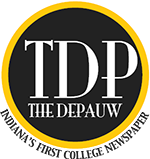
As DePauw University students finalize their courses for the 2017 semester, one class in particular, a course titled “Mini-colloquium on Important Books,” has sparked student interest.
The class is a Prindle reading course, which are designed to give students an opportunity to focus on subjects which raise issues of ethical concern.
For eight weeks, students will come to class prepared to discuss different influential texts, some ancient, some recent, about what human beings value and have valued throughout history.
For the Mini-colloquium, texts will include works such as: “The Book of Job”, Aristophanes' “The Birds”, “Analects of Confucius”, Virginia Woolf's “Orlando”, Voltaire's “Candide”, Freud's “Civilization and Its Discontents,” “The History of Mary Prince”, and Junot Diaz's “Brief Wondrous Life of Oscar Wao.”
One of the two coordinators for the course is Professor Keith Nightenhelser, who teaches philosophy, classical studies and Honors Scholar courses.
“There’s an old tradition of having courses like this in the Liberal Arts curriculum,” Nightenhelser said. “But this is unlike a typical course.” The course is designed so that two rotating co-instructors are present for every session, changing each week, to supervise student discussion.
The co-instructors will include President Mark McCoy, Vice President for Academic Affairs, Anne Harris, University Chaplain, Maureen Knudsen-Langdoc, Assistant Dean, Jeannette Johnson-Licon, and Professors Humberto Barreto, Ted Bitner, Angela Flury, Erik Wielenberg, and others.
“They aren’t present to teach, or as experts on the texts,” said Nightenhelser. “They’re present just to make sure the discussion stays on track, and to observe it, and give students evaluations for how they participate.”
The other coordinator is Professor of Economics, Humberto Barreto. “The reading list is all over the map,” Barreto said. “I want students to be excited about that and to have that intellectual curiosity and life of the mind. I think that, that is what this course, and DePauw in general, is trying to foster.”
In terms of choosing faculty members to facilitate in the course sessions, Barreto says he and Nightenhelser looked for people who could potentially be experts on the subject matter, but didn’t necessarily have to be.
Harris is excited about the opportunity to be a co-instructor to the discussion of Aristophanes' “The Birds.”
“What’s exciting to me is that I haven’t read it before,” Harris said, “But that’s very much the Great Books Approach. This approach argues that great texts speak to people who listen, and all you need to bring is not your expertise, but your curiosity.”
The course is mainly designed for juniors and seniors, and both Nightenhelser and Barreto agree that this is intentional.
“The idea is that by the time students have gotten their basic kit of skills together as juniors and seniors, they can participate as largely generally educated people, in discussions of rich works by well-known writers,” said Nightenhelser.
“I do think that the more further along in the academic path the students are, the more interesting things you’ll say and the more fun you’ll make the conversation,” Barreto said. “You have to be willing to talk and express yourself, and disagree.”
Harris said she has high hopes for the students who enroll to take the course.
“I truly hope that students are swept away by their own curiosity,” Harris said. “I hope that students feel wonder at voices that have been gone for hundreds of years, and I hope that students find each other in this space of discovery.”
The seminar will be worth 0.25 credits andwill meet Tuesday nights from 7:00-8:30pm in Julian. At the time of publication, the class had six open slots.


